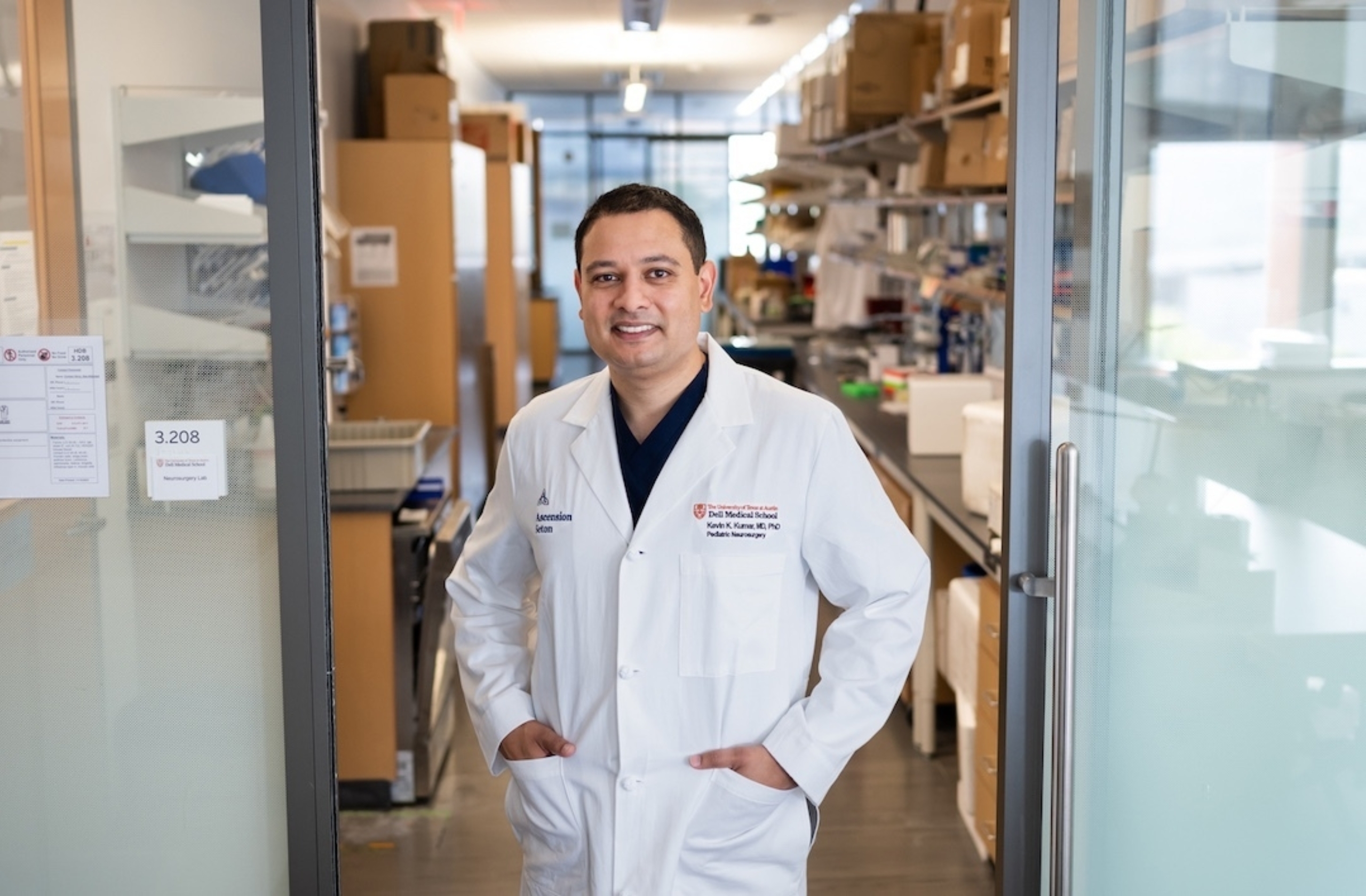Kevin Kumar, M.D., Ph.D., arrived in Austin in the summer of 2024 with a clear mission: to shape a future where children with brain tumors and other neurological disorders receive the best possible care and achieve the best outcomes.
As a practicing pediatric neurosurgeon with UT Health Austin Pediatric Neurosciences at Dell Children’s, as well as a researcher and assistant professor in Dell Medical School’s Department of Neurosurgery, Kumar is leveraging a range of research expertise at UT to translate discovery to the operating room — and forging new paths to recovery for some of Austin’s youngest, most medically complex patients.

Kevin Kumar, M.D., Ph.D.
Q&A With Kumar
In what ways do your roles as a pediatric neurosurgeon and a researcher complement each other?
My work centers on treating young patients with complex brain and spinal conditions. Through advanced research, clinical integration and collaborative mentorship, my work aims to expand treatment options and improve outcomes for children with pediatric brain tumors. By working alongside experts in biomedical engineering and pharmacology at UT Austin, I hope to create novel, interdisciplinary solutions for pediatric gliomas — a leading cause of mortality in children.
My approach to neurosurgery is both highly technical and deeply personal, as I recognize the critical role the brain plays in shaping every aspect of who we are, especially in young patients. Each surgery represents an opportunity to preserve or improve a child’s quality of life and potential for the future.
Witnessing children reach developmental milestones after complex surgeries reinforced my commitment to the field of neurosurgery and opened my eyes to the potential of translational research in pediatric neurosurgery. As a pediatric neurosurgeon and researcher, my goal is not only to perform complex surgeries but also to develop innovative, science-driven therapies that address the unique challenges these young patients face.
My lab is dedicated to advancing research on cellular-based therapies, including microglia replacement therapy. Microglia, the brain’s resident immune cells, play a significant role in influencing tumor growth and progression, and by focusing on microglia replacement, we aim to explore new therapeutic strategies. This approach allows us to target the unique biology of pediatric brain tumors, potentially altering disease progression and providing new hope for affected children and their families.
What memories or experiences have most shaped your approach to developing new therapies?
My interest in neuroscience began with my studies in neurobiology at Cornell University. This interest deepened when my father was diagnosed with multiple sclerosis, which inspired my commitment to developing new therapies for neurological conditions.
During my M.D. and Ph.D. training, the realization of having the opportunity to make a profound impact on patients’ lives in the operating room — combined with my growing interest in cellular therapeutics — cemented my commitment to neurosurgery training. Building on my undergraduate research experience, my dissertation focused on manganese regulation in neurons under Dr. Aaron Bowman, contributing insights relevant to Parkinson’s and Huntington’s diseases.
My experience as a family member of a person affected with a neurological disease informs both my research and my practice. One of the most defining moments in my career path came early in my residency, when I began taking call on the pediatric neurosurgery service. I was responsible for evaluating and caring for young patients dealing with a wide range of conditions — hydrocephalus, traumatic brain injuries, epilepsy and brain tumors.
For many families, I was their first interaction with a neurosurgeon, and explaining complex diagnoses and treatment options became a highly rewarding experience. This role allowed me to see the profound impact that careful surgical planning, technical precision and compassionate care could have on young lives, often resulting in remarkable recoveries.